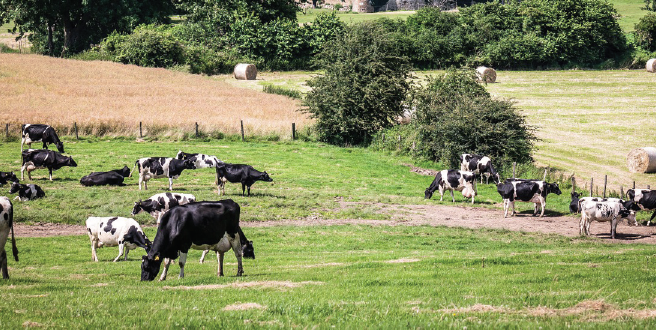 A CARMARTHEN farmer who moved dairy cattle onto his farm, which had TB restrictions in place, without a licence was given a conditional discharge at Llanelli Magistrates’ Court after his previous good character was taken into account.
A CARMARTHEN farmer who moved dairy cattle onto his farm, which had TB restrictions in place, without a licence was given a conditional discharge at Llanelli Magistrates’ Court after his previous good character was taken into account.
David Hartman, 43, of Trebersed Farmhouse, St Peters, pleaded guilty to moving 42 cows onto his farm on October 10, 2015, in contravention of an order restricting movement of stock which had been imposed four days earlier.
Hartman also pleaded guilty to moving a further seven cattle onto the land on October 19 and October 28, and to failing to comply with isolation restrictions by not ensuring that 15 cattle were kept isolated from the rest of the herd.
Prosecuting for Carmarthenshire County Council, Kelly Byrne said that on September 21, 2015, Harman had sought a permit to move milk cows onto Trebersed Farm, which was under a TB restriction.
However, a farm visit showed that 15 cows which had an inconclusive reactor (IR) response to a bTB test were kept with regular cattle, and a licence was not granted.
Hartman emailed on October 2 asking for his licence request to be ‘escalated’ and again on October 10, in which he said he was ‘desperate’ to move animals onto the land to help his business.
He was advised that further bTB tests would have to be carried out on all his cattle.
Hartman emailed the Welsh Government on October 9 asking for a licence, but received no response until October 18.
However, by this time, he had already moved 44 dairy cows onto the farm without a licence, followed by a further six on October 19 and a bull on October 28.
Defending Hartman, Aled Owen pointed out that animals were moved onto bTB farms on ‘a regular basis’.
“Some farms in Carmarthenshire have had bTB restrictions for 10-15 years,” he added.
Mr Owen suggested that the guidance for farmers was ‘rather fluid, with nothing enshrined in doctrine or convention’.
“This breeds uncertainty, and rumours about what is right in terms of the legislation,” he added, remarking that ‘people are giving advice in good faith but that advice is not always correct’.
Mr Owen also stressed the parlous condition of the dairy industry in the UK, and the threats raised by imported milk. “While people may be cynical, and say that ‘farmers always say that’, for the first time in three or four years, it is true,” he added.
Mr Owen suggested that the offence was far less serious that, for example, knowingly moving an animal infected with bTB. The bench was given copies of references from vets and the local Farmers’ Union branch, and heard that Hartman was viewed in the community as ‘an excellent stockman’.
Hartman told the court that he accepted what he had done was ‘totally wrong’ and apologised. However, he stressed that there had been no ‘reactors’ – cows with bTB – placed with healthy stock, and that the 15 IR cattle all gave negative results when tested.
Hartman added that he had been granted two licences to move cattle onto his farm since last October. “What I did was to try and protect my business and safeguard a future for my family,” he said.
Magistrates told Hartman that the offences were serious, but in view of his previous clean character, and that he had taken all the steps necessary to rectify the situation, they had taken the decision to give him an 18 month conditional discharge. He was ordered to pay £2,000 towards prosecution costs and a surcharge of £15.


















Add Comment